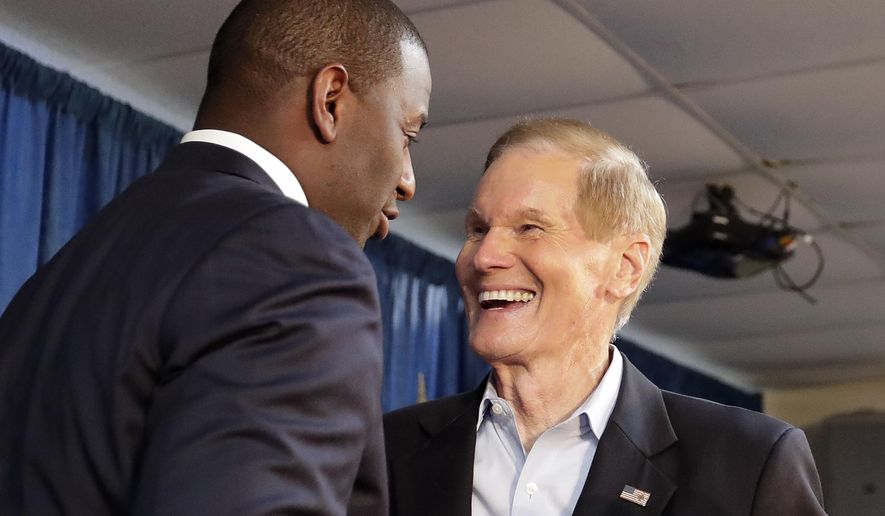In elections decided by a percentage point, “every vote counts” becomes more than a cliché and Florida Democrats indicated Friday they think they can make it a clincher.
In a conference call with reporters, the party boasted of “new technology, boots on the ground, strategy and analytics,” said Juan Penalosa, the executive director of the Florida Democratic Party.
The effort is coming in a significant off-year midterm that will see Sunshine State voters choose a new governor and decide whether the current one should replace the longtime Democratic incumbent in the U.S. Senate. With the exception of GOP Sen. Marco Rubio’s re-election in 2016, recent statewide races in Florida have been extremely close, the winner enjoying a 1-point edge.
Mr. Penalosa said the Democrats embarked in February on an ambitious program to register and retain Hispanic voters, a push that for the first time encompasses “all 67 counties” in Florida.
Early success from the work has come in the last five special elections in Florida districts that were won by the Democrats, three of them in places where the GOP traditionally has enjoyed an advantage with Hispanic voters, according to Mr. Penalosa.
But Florida’s Republicans have also been heavily focused in the 2018 election cycle on attracting Latino voters in a population that is no longer mostly comprised of conservative Cuban-Americans. For example, GOP Gov. Rick Scott, seeking to unseat Democratic Sen. Bill Nelson, has made eight trips to Puerto Rico since the U.S. island was ravaged by Hurricane Maria in September 2017, and Mr. Scott made a point of personally greeting many Puerto Ricans who fled their homeland for Florida after the storm.
Elections in Florida are notoriously expensive. The cost of the program outlined by Mr. Penalosa was not revealed, with both he and a memo the party sent out summarizing it all saying only it had spent “six figures.”
With Cuban-Americans no longer the largest Hispanic bloc, campaigns are forced to look at Florida counties where the Hispanic population is majority Venezuelan or Puerto Rican. While Mr. Penalosa said the new strategies have allowed Democrats to tailor their messages more closely to specific targets, he said “core Democratic value like affordable health care, equal access to good paying jobs and the environment,” remain the main planks.
On the Republican side, too, party officials said they believe their core message will resonate with Hispanics.
“Unlike the Democrats, Republicans are not taking Hispanic-Americans for granted and we fighting daily to reach them on national and local level, alike,” said GOP Florida Chairman Blaise Ingoglia. “For far too long, in the political arena, Hispanics have been treated as monolithic, but the ever-growing voting bloc is on the rise and the Republican Party is focusing on what matters most to them – family values, small business, education and tax cuts.”
A recent poll in Florida from Latino Decisions found that Hispanics said they had been contacted by Republicans but not Democrats by a 51-34 margin. Mr. Penalosa said he was aware of that poll but disputed its findings.
The Democratic strategy isn’t all high-tech, Mr. Penalosa said, noting the party machinery is putting renewed emphasis on “old school, back-to-basics,” political tools such as fielding ward and precinct captains who have been instrumental in this year’s effort to contact 8 million voters.
Overall voter registration figures for Florida, which lag real time by about 30 days, show the Democrats with a narrow edge, 4.8 to 4.6 million.
Since May, when the party ramped up its Hispanic operation, the Democrats have hired 70 full-time “organizers dedicated to Hispanic dense turf, 50 of whom are fully bilingual,” according to the Florida Democrats’ memo.
Although Mr. Penalosa said Democrats have made huge gains in terms of voter registration – between February and August, he claimed, the Democrats have beaten the GOP by a 2-1 margin in that area — Republicans have also increased their registration numbers. Nevertheless, the August primary returns, in which Tallahassee’s left-wing Mayor Andrew Gillum defeated a more establishment liberal for the gubernatorial race, showed the highest Hispanic Democratic turnout since 1978, Mr. Penalosa said.
Republicans noted that while Hispanic Democratic turnout may have been high in the primary, the only Hispanic ticket offered to voters in November is on the GOP side where former Rep. Ron DeSantis opposes Mr. Gillum with running mate state Rep. Jeanette Núñez.
• James Varney can be reached at jvarney@washingtontimes.com.




Please read our comment policy before commenting.